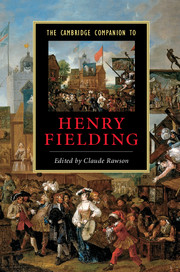Book contents
- Frontmatter
- Introduction
- 1 Henry Fielding’s life
- 2 Fielding’s theatrical career
- 3 Shamela
- 4 Joseph Andrews
- 5 Jonathan Wild
- 6 Tom Jones
- 7 Amelia
- 8 Fielding’s periodical journalism
- 9 Fielding and female authority
- 10 Fielding on society, crime, and the law
- 11 Fielding’s style
- 12 Fielding’s afterlife
- Guide to further reading
- Index
- Series List
10 - Fielding on society, crime, and the law
Published online by Cambridge University Press: 28 July 2007
- Frontmatter
- Introduction
- 1 Henry Fielding’s life
- 2 Fielding’s theatrical career
- 3 Shamela
- 4 Joseph Andrews
- 5 Jonathan Wild
- 6 Tom Jones
- 7 Amelia
- 8 Fielding’s periodical journalism
- 9 Fielding and female authority
- 10 Fielding on society, crime, and the law
- 11 Fielding’s style
- 12 Fielding’s afterlife
- Guide to further reading
- Index
- Series List
Summary
Fielding established himself as a writer before he embarked on his legal studies, and he had achieved success in the novel before he became a magistrate. Nevertheless, issues related to crime and the law underlay his entire career as an author, even in his earlier days as a dramatist and journalist. For much of the 1730s, he had practised the often reviled trade of a professional scribbler, and on several occasions found himself in the line of ministerial fire because of his Oppositional broadsides against officialdom. At the end of the decade his social position was more respectable, even though his finances remained on a precarious footing and his debts brought him into the courtroom as a defendant rather than an advocate. By the time Tom Jones was published, he held a central position in the judicial system of London, as chief magistrate for Westminster. This may look like a sudden swerve, but it was not altogether an unpredictable development. His family background, for one thing, included distinguished jurists. Nevertheless, his ancestry also embraced a number of soldiers, and Fielding did not join the army; it also covered some notable churchmen, and he did not enter holy orders. Some explanation is called for, since a variety of personal and political factors must have gone into his decision to switch the course of his life.
As soon as Fielding was appointed to the magistracy, he naturally took a central role in the national discourse regarding legal and social affairs. The area of his responsibility covered some of the most notorious blackspots in the entire country, with a thriving criminal subculture and a pattern of unrest marked by frequent riots. In addition, Fielding did more than serve as a proactive Justice of the Peace in the capital. He wrote widely on matters of public policy, as they were affected by the law and by the institutions which supported its implementation: pamphlets, charges to the jury, and articles in the press flowed from his pen during the brief tenure of his magistracy. Of course, his novels deal centrally with some of the same issues, as they had done from the start.
- Type
- Chapter
- Information
- The Cambridge Companion to Henry Fielding , pp. 137 - 152Publisher: Cambridge University PressPrint publication year: 2007
- 1
- Cited by



